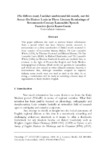Mostrar o rexistro simple do ítem
The fellows mad, I neither understand his words, nor his Sence: On Dialect Lexis in Three Literary Renderings of Seventeenth-Century Lancashire Speech
| dc.contributor.author | Ruano García, Francisco Javier | |
| dc.date.accessioned | 2016-07-15T08:35:27Z | |
| dc.date.available | 2016-07-15T08:35:27Z | |
| dc.date.issued | 2008 | |
| dc.identifier.citation | AEDEAN 2008, 31: 405-414 ISBN-978-84-9749-278-2 | |
| dc.identifier.isbn | 978-84-9749-278-2 | |
| dc.identifier.uri | http://hdl.handle.net/2183/17054 | |
| dc.description.abstract | [Abstract] This paper addresses the need to retrieve lexical information from a period which has been hitherto poorly assessed. Itconcentrates on a close examination of dialect words scattered inthree samples of Lancashire literary dialect: The Late Lancashire Witches (1634), by Thomas Heywood and Richard Brome; The Two Lancashire Lovers (1640), by Richard Brathwaite; and The Lancashire Witches (1682), by Thomas Shadwell. Its aims are twofold: first, to evaluate, in the light of Present-day English and Early Modern lexicographical evidence, which words are genuine to Lancashire and which are also natural to other adjacent counties. Second, it demonstrates that, although nowadays assigned to regional dialects, some words were not used as such at the time. In so doing, a contribution will be made to outlining a lexical map of regionalisms in Early Modern English. | |
| dc.language.iso | eng | |
| dc.publisher | Universidade da Coruña | |
| dc.title | The fellows mad, I neither understand his words, nor his Sence: On Dialect Lexis in Three Literary Renderings of Seventeenth-Century Lancashire Speech | |
| dc.type | info:eu-repo/semantics/conferenceObject | |
| dc.rights.access | info:eu-repo/semantics/openAccess |






